- Home
- Chinua Achebe
The Education of a British-Protected Child: Essays Page 2
The Education of a British-Protected Child: Essays Read online
Page 2
My father filled our walls with a variety of educational material. There were Church Missionary Society yearly almanacs, with pictures of bishops and other dignitaries. But the most interesting hangings were the large paste-ups which my father created himself. He had one of the village carpenters make him large but light frames of soft white wood onto which he then gummed brown or black paper backing. On this paper he pasted colored and glossy pictures and illustrations of all kinds from old magazines. I remember a most impressive picture of King George V in red and gold, wearing a sword. There was also a funny-looking little man with an enormous stride. He was called Johnnie Walker. He was born in 1820, according to the picture, and was still going strong. When I learnt many years later that this extraordinary fellow was only an advertisement for Scottish whiskey, I felt a great sense of personal loss. There was an advertisement from the Nigerian Railways in which the big “N” and “R” served also for “National Route.” That also gave me some trouble, as I recall reading it as “Nigerian National Railway Route,” which made some kind of sense too!
So my education went from the walls of our home in a haphazard fashion through the village to St. Philip’s C.M.S. Central School and back again.
It was sheer effrontery, hinting at any kind of comparison between my puny story and the story of Moses at the beginning of this account. It was like the glowworm comparing itself to the full moon. I do apologize. I was carried away. But the village of Ogidi did keep surreptitious watch over me through the exile of Christianity. My river, though, was not the Nile but the Niger. Indeed, our official title was the Diocese on the Niger. Not of the Niger but on. Our bishop was Bishop on the Niger.
The village of Ogidi was only part Christianized when I was growing up and still provided its traditional sights and sounds from which I—a Christian child—was technically excluded, an exclusion making them all the more compelling. Like all children I looked forward to the Nwafor Festival, the major holiday of the traditional year, during which ancestral masquerades of all kinds left their underground homes through antholes to visit the living. For eight whole days we saw them, from a reasonable distance, because they and their attendants carried bundles of whips with which they occasionally punished themselves to prove their toughness and certainly punished you if you were available. We would keep count of the masquerades we saw every day and tally the figures at the end of the eight days and then compare our grand total with the previous year’s. In a good year, the number could be well over a hundred. And the rule was that even if you saw the same masquerade ten times (as might happen with the livelier ones), you only counted it once.
And then the sounds of the village.
There was language, in song and speech, all around you. True, Christianity divided the village into two—the people of the church and the people of the world—but the boundary between them had very many crossings. The average Christian enjoyed the sights and sounds of traditional festivities. Non-Christians, for their part, observed us closely and treated some of our practices with indulgent amusement. In the most celebrated song of those days—“Egwu obi,” “Song of the Heart”—they mimicked our singing in tonic sol-fa:
Ukwe ndi uka
Sss ddd m rd mr-e-e
In spoken language there was sometimes a difference in matter but none in manner between church and village. There were great orators in both. Christians of my father’s generation who preached on Sundays at St. Philip’s Church were not all orators, but a good number of them were. Although the Anglican Church, in a misguided effort at unification, had dealt a severe blow to the Igbo language by imposing a mechanical “union” dialect on it, the hybrid language it created remained between the covers of the Bible and was not allowed to cramp the style of sensible preachers once they had read out their obligatory text and closed the Bible. One such preacher was well known for taking to the pulpit at the time of the village feast to warn true believers against the great evil of accepting gifts of food surreptitiously over their compound wall from heathen neighbors. Obviously the traffic was heavy on the crossings. Christians had their own festivals, of course: the big one, Christmas, and the small one, Easter, although preachers kept telling you it was the other way around.
There were also two secular festivals which livened up our Christian year—Empire Day on May 24, and Anniversary on July 27.
May 24, as every schoolchild knew, was the birthday of Queen Victoria. It was a major school event and schoolchildren from all over the district would march in contingents past the British resident, who stood on a dais wearing a white ceremonial uniform with white gloves, plumed helmet, and sword.
The day’s events ended with a sports competition among the schools. My first Empire Day was indeed memorable. My school, which had some very big boys and was supposed to do well in the tug-of-war, managed quite unaccountably to collapse in seconds to their opponents. Rumor had it that this was no ordinary rout but an Anglican plot whereby our headmaster had instructed our boys to give in to a fellow Anglican side to prevent a Roman Catholic victory. Empire Day celebrations took place at the provincial headquarters at Onitsha, seven miles from my village. I think it was in 1940, when I was in Standard Three and ten years old, that I was judged old enough to walk to Onitsha and back. I did it all right but could hardly get up for one week afterwards. And yet it was a journey I had looked forward to so eagerly and which I cherished for years. Onitsha was a magical place and did live up to its reputation. First of all, to look down from a high point on the road at dawn and see, four miles away, the River Niger glimmering in the sky took a child’s breath away. So the river was really there! After a journey of two thousand six hundred miles from the Futa Jalon Mountains, as every schoolboy would tell you. Well, perhaps not every schoolboy. I was particularly fortunate in having parents who believed passionately in education, in having old schoolbooks that three older brothers and an older sister had read. I was good enough in my schoolwork to be nicknamed Dictionary by admirers. Although not so good in games; but no one in our culture would seriously hold that against anybody.
Two other things stand out in my mind about that first Empire Day visit to Onitsha. Cut free from my village moorings and let loose in a big city with money in my pocket, I let myself go; go so far, in fact, as to consume a half-penny worth of groundnuts. For many years afterwards the very mention of groundnuts would turn my stomach.
My other memory is much happier. I saw with my own eyes a man who was as legendary as Onitsha itself, an eccentric Englishman, Dr. J. M. Stuart Young, who had been living and trading in Onitsha since the beginning of the twentieth century. I saw him walking down New Market Road bareheaded in the sun, just as legend said he would be. The other thing legend said about Stuart Young was that he had been befriended by the mermaid of the River Niger, with whom he made a pact to remain single in return for great riches.
Later I was to learn that J. M. Stuart Young’s story contained a few doubtful details, such as whether or not he did have a doctoral degree. But it was probably true that he had first come to Nigeria as a colonial civil servant and then turned against the colonial system and become a merchant intent on challenging, with African support, the monopoly of European commercial cartels. He also wrote and published poetry and fiction. Years later I was to invoke his memory and name in my short story “Uncle Ben’s Choice.”
The other secular event, which we called simply Anniversary, was the annual commemoration of the coming of the Gospel to Igboland, on July 27, 1857. It is reported that Bishop Adjai Crowther and his missionary team, who arrived in Onitsha on that day, were heavily beaten by rain, and as a result every Anniversary celebration since has been ruined by bad weather. Perhaps those first Anglicans did not know where the rain began to beat them! The good news is that schoolchildren were always fed new yams and stew at the Anniversary celebration. For most people it was their first taste of juicy new yam for the year.
British colonization of Nigeria was never a labor-intensive affair.
White people were a rare sight, whether in the administration or the church or in commerce. This rareness did not, however, diminish their authority. The name of the British resident for Onitsha Province, Captain O’Connor, was so generally invoked that there is an age-grade named after him in Ogidi.* But I only saw him twice, from a distance. The bishop on the Niger, the Right Reverend Bishop Bertram Lasbrey, came to our church perhaps once in two or three years. His sermon left me disappointed. I don’t know what I expected; perhaps I thought that if mere teachers and pastors could do as well as some that I knew, a bishop must set a congregation ablaze. But perhaps again it was the problem of having to preach through an interpreter.
Elementary education began with two years in infant school and six years in primary school. For some children there was a preschool year in what was called religious school, where they spent a year chanting and dancing the catechism.
Who is Caesar?
Siza bu eze Rom
Onye n’achi enu-uwa dum.
(Caesar is the King of Rome
Who rules the entire world.)
Who is Josiah?
Josaya nwata exe
Onye obi ya di nlo
Onatukwa egwu Chineke.
(Josiah the infant king
Whose heart was soft;
He also feared the Lord.)
But I was spared that. I suppose I imbibed adequate amounts of religion at home from the daily portions of the Bible we read at prayer time every morning and every night.
The Second World War began just as I was finishing my second year in primary school, that is, in Standard Two. The rest of my primary education happened against its distant background. But it got close one morning when two white people and their assistants came to our school and conscripted our art teacher.
I think we were loyal to Britain and did what we could to help. I remember the campaign to increase the production of palm kernels for the war effort. Our headmaster told us that every kernel we collected in the bush would buy a nail for Hitler’s coffin. As the war continued, supplies for home and school became more and more scarce. Salt was severely rationed, and disappeared from the open market.
We soldiered along, singing “Rule, Britannia!,” but the really popular song was “Germany Is Falling”:
Germany is falling, falling, falling
Germany is falling to rise no more.
If you are going to Germany before me
Germany is falling to rise no more
Tell Hitler I’m not coming there
Germany is falling to rise no more.
If you are going to Italy before me
Tell Mussolini I’m not coming there.
If you are going to Japan before me
Tell Hirohito I’m not coming there.
The enemy list concluded, you moved on to friends whom you were naturally prepared to visit:
If you are going to England before me
Tell Churchill I am coming there.
If you are going to America before me
Tell Roosevelt I am coming there.
If you are going to Russia before me
Tell Stalin I am coming there.
If you are going to China before me
Tell Chiang Kai-shek I am coming there.
If you are going to Abyssinia before me
Tell Haile Selassie I am coming there.
Sung lustily in an arrangement for cantor and chorus, “Germany Is Falling” was as stirring as “Onward, Christian Soldiers” and other evangelical war songs.
I had two choices for secondary school—the very popular Dennis Memorial Grammar School, a C.M.S. institution in Onitsha, or Government College, Umuahia, much farther away and much less known to me. My elder brother John, a teacher who had taken me to live with him in my last year of primary school, decided I should go to Umuahia. It was not the decision I would have made myself. But John turned out to be, as usual, absolutely right.
I don’t know what prompted the British colonial administration in Nigeria in the decade following the end of the First World War to set up two first-class boarding schools for boys in Nigeria, one at Ibadan and the other at Umuahia. The arguments, whatever they were, must be fascinating, but I have not been privileged to read them. Howbeit, an extraordinary English cleric, Robert Fisher, was appointed the founding principal of Government College Umuahia, and the school opened its doors in 1929. By the time Fisher retired eight years later, Umuahia was a byword in Nigeria for excellence.
Then came the Second World War, and other arguments prevailed in colonial high places, and Government College Umuahia was closed down and its buildings turned over to a prisoner-of-war camp for German and Italian nationals. There was yet a third change of colonial mind even before the war ended, and the campus was returned to education and ready to accept my generation of students in 1944. Colonial policy moved in mysterious ways!
Our new principal, William Simpson, a Cambridge man in the colonial education service, set about rebuilding the school. And what a job he did! His experience of colonial education must have persuaded him that “excessive devotion to book-work is a real danger,” as he constantly intoned for our benefit, and that the cramming which often passed for education in the colonies was in fact education’s greatest enemy. Though Simpson was a mathematics teacher, he made a rule which promoted the reading of novels and prohibited the reading of any textbooks after classes on three days of the week. He called it the Textbook Act. Under this draconian law, we could read fiction or biographies or magazines like Illustrated London News or write letters or play Ping-Pong or just sit about, but not open a textbook, on pain of detention. And we had a wonderful library from Robert Fisher’s days to support Mr. Simpson’s Textbook Act.
Perhaps it was a mere coincidence, but Government College Umuahia alumni played a conspicuous role in the development of modern African literature. That so many of my colleagues—Christopher Okigbo, Gabriel Okara, Elechi Amadi, Chukwuemeka Ike, I.N.C. Aniebo, Ken Saro-Wiwa, and others—should all have gone to one school would strike anyone who is at all familiar with this literature. What we read in the school library at Umuahia were the books English boys would have read in England—Treasure Island, Tom Brown’s School Days, The Prisoner of Zenda, David Copperfield, et cetera. They were not about us or people like us, but they were exciting stories. Even stories like John Buchan’s, in which heroic white men battled and worsted repulsive natives, did not trouble us unduly at first. But it all added up to a wonderful preparation for the day we would be old enough to read between the lines and ask questions…
In my first or second year at Umuahia the postwar Labour government in Britain decided that a university in West Africa might not be a bad idea. So a high-powered commission under Walter Elliot was sent to survey the situation on the ground. Such was the reputation of Umuahia that the commission paid us a visit and spent a whole weekend at our school. Most of them came to chapel service on Sunday morning, but Julian Huxley, the biologist, roamed our extensive grounds watching birds with binoculars.
The Elliot Commission Report led to the foundation of Nigeria’s first university institution: a university college at Ibadan in special relationship with London. By the time it was built I was ready for university education and so walked in. By that time also I was no longer a British-Protected Child but a British Protected Person.
One of the more remarkable teachers I encountered at Ibadan was James Welch, professor of religious studies. I was intrigued by all the things he was said to have done before coming to Ibadan—head of religious broadcasting at the BBC in London; chaplain to the king; principal of a theological college. He had even gone to Nigeria before all that as a missionary in the 1930s, and then had returned to Africa at the end of the war as director of education with the British government’s ill-fated East African Groundnut Scheme.
In my final year at Ibadan, I once had a chance to discuss with Professor Welch one of a growing number of disagreements the students were beginning to have w
ith the college. He was then vice principal. In some exasperation he said to me, “We may not be able to teach you what you want or even what you need. We can only teach you what we know.”
Even in exasperation, James Welch stayed calm and wise. What else can an honest and conscientious teacher teach but what he knows? The real teachers I have had in my life have been people who did not necessarily know what my needs would ultimately be but went ahead anyhow in good faith and with passion to tell me what they knew, leaving it to me to sort out whatever I could use in the search for the things that belonged to my peace. Because colonialism was essentially a denial of human worth and dignity, its education program would not be a model of perfection. And yet the great thing about being human is our ability to face adversity down by refusing to be defined by it, refusing to be no more than its agent or its victim.
What I have attempted to suggest in this rambling essay is the potency of the unpredictable in human affairs. I could have dwelt on the harsh humiliations of colonial rule or the more dramatic protests against it. But I am also fascinated by that middle ground I spoke about, where the human spirit resists an abridgement of its humanity. And this was to be found primarily in the camp of the colonized, but now and again in the ranks of the colonizer too.
The Reverend Robert Fisher was such a spirit. Technically he was of the camp of the colonizer. But such was the vision and passion he brought to his task of creating a new school at Umuahia that when he was offered a bishopric in the course of his labors he turned it down. Years later, he attempted to make light of that decision by saying he wouldn’t have made a good bishop anyway. But that was not the reason. The crest he brought to Umuahia was a pair of torches, one black, one white, shining together silently. A generation later an Australian teacher added the logo “In unum luceant” under the emblem.

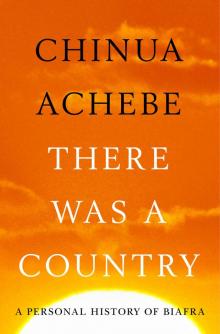 There Was a Country: A Memoir
There Was a Country: A Memoir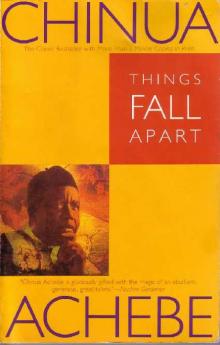 Things Fall Apart
Things Fall Apart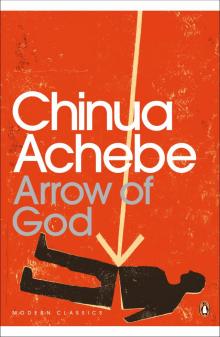 Arrow of God
Arrow of God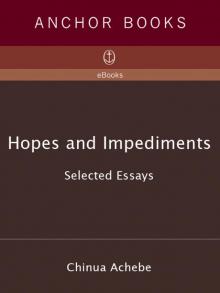 Hopes and Impediments: Selected Essays 1965-87
Hopes and Impediments: Selected Essays 1965-87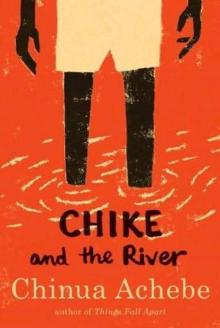 Chike and the River
Chike and the River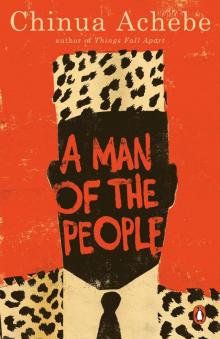 A Man of the People
A Man of the People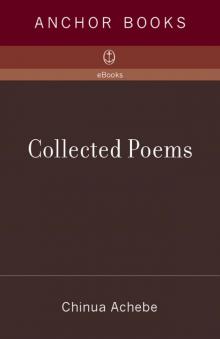 Chinua Achebe: Collected Poems
Chinua Achebe: Collected Poems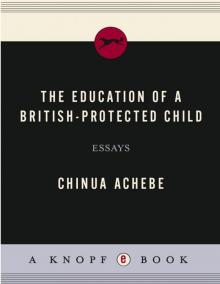 The Education of a British-Protected Child: Essays
The Education of a British-Protected Child: Essays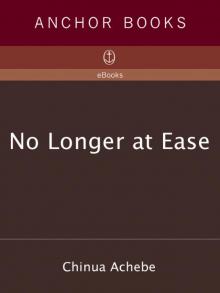 No Longer at Ease
No Longer at Ease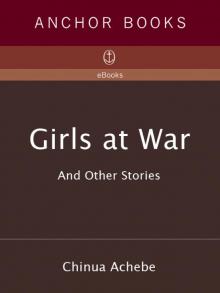 Girls at War
Girls at War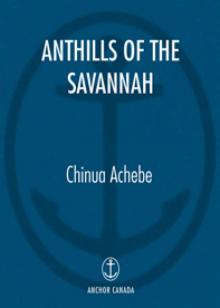 Anthills of the Savannah
Anthills of the Savannah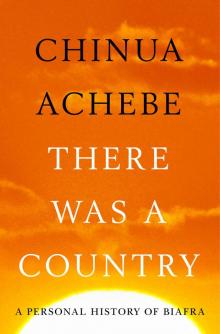 There Was a Country: A Personal History of Biafra
There Was a Country: A Personal History of Biafra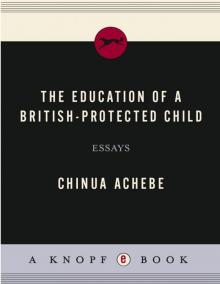 The Education of a British-Protected Child
The Education of a British-Protected Child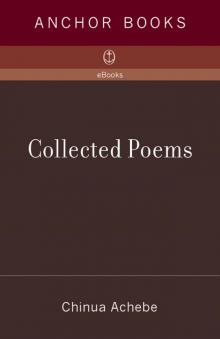 Collected Poems
Collected Poems